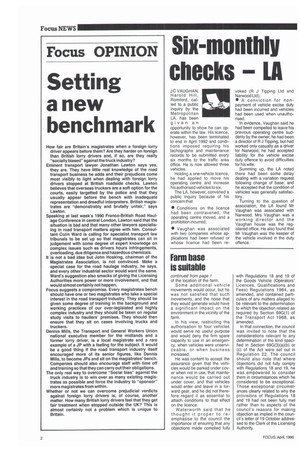Focus OPINION
Page 4

If you've noticed an error in this article please click here to report it so we can fix it.
Setting anew benchmark
How fair are Britain's magistrates when a foreign lorry driver appears before them? Are they harder on foreign than British lorry drivers and, if so, are they really ''socially biased'' against the truck industry?
Eminent transport lawyer Jonathan Lawton says yes, they are. They have little real knowledge of the road transport business he adds and their prejudices come most visibly to light when dealing with foreign lorry drivers stopped at British roadside checks. Lawton believes that overseas truckers are a soft option for the courts, easily targetted by the police and that they usually appear before the bench with inadequate representation and dreadful interpreters. British magistrates are "demonstrably and brutally unfair," says Lawton.
Speaking at last week's 1990 Franco-British Road Haulage Conference in central London, Lawton said that the situation is bad and that many other lawyers specialising in road transport matters agree with him. Consultant Colin Ward is calling for specialist transport law tribunals to be set up so that magistrates can sit in judgement with some degree of expert knowledge on complex issues such as drivers hours infringements, overloading, due diligence and hazardous chemicals. It is not a bad idea but John Hosking, chairman of the Magistrates Association, is not convinced. Make a special case for the road haulage industry, he says, and every other industrial sector would want the same. Ward's suggestion also smacks of giving the Licensing Authorities more power or more involvement, and that would almost certainly not happen.
Focus suggests a compromise. Every magistrates bench should have one or two magistrates who take a special interest in the road transport industry. They should be given some degree of training in the background and working practices of our over-legislated and highly complex industry and they should be taken on regular study visits to hauliers' premises. They should then ensure that they sit on cases involving trucks and truckers.
Dennis Mills, the Transport and General Workers Union national executive member for the midlands and a former lorry driver, is a local magistrate and a rare example of a JP with a feeling for the subject. It would be a good thing if the road transport industry itself encouraged more of its senior figures. like Dennis Mills, to become JPs and sit on the magistrates bench. Companies should also encourage staff with time off and training so that they can carry out their obligations. The only real way to overcome "Social bias" against the truck industry is to win over as many existing magistrates as possible and force the industry to "sponsor" more magistrates from within.
Whether or not we can overcome prejudicial verdicts against foreign lorry drivers is, of course, another matter. How many British lorry drivers feel that they get fair treatment when stopped outside the UK? This is almost certainly not a problem which is unique to Britain,
























































































































































